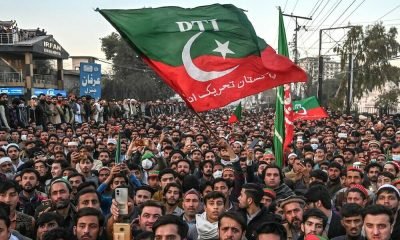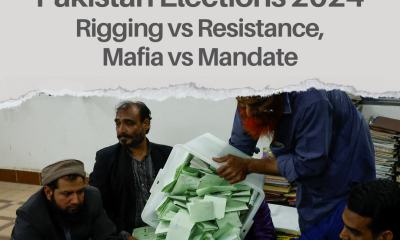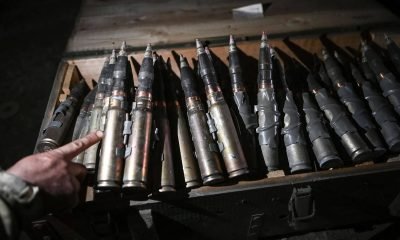Pakistan
Systematic Dismantling of Pakistan’s Democracy
Pakistan is set to have General Elections in Feb 2024, but the journey to this point has been marred by controversy and pre-poll rigging that threatens the very essence of democracy. The Pakistani regime seems determined to undermine the will of the people and further erode Pakistan’s already fragile democratic foundations.

Pakistan is set to have General Elections in Feb 2024, but the journey to this point has been marred by controversy and pre-poll rigging that threatens the very essence of democracy. The Pakistani regime seems determined to undermine the will of the people and further erode Pakistan’s already fragile democratic foundations.
Since the ouster of Imran Khan’s government through a US-backed regime-change operation, Pakistan has witnessed political and economic turmoil, Constitutional erosion, and grave human rights violations – the very pillars of democracy.
As Imran Khan’s movement for Pakistan’s “Haqiqi Azadi” (true freedom) resonated with the masses and led to widespread protests, those in power responded with tactics to systematically dismantle Pakistan’s democracy. This was done through a 7-stage process
Stage 1: First, the Pakistani regime curtailed the freedom of speech. Dissenting voices faced threats, harassment, and even physical and sexual torture. The right to express oneself became a perilous endeavour.
Stage 2: Next, a brutal crackdown against PTI leaders, workers, and supporters unfolded. Abductions, torture, and arbitrary detentions became the order of the day. This intensified post-9 May 2023 protests, after which the entire PTI’s first-tier leadership, as well as over 10,000 PTI supporters were abducted or arbitrarily detained. Those abducted were ruthlessly tortured in custody and threatened with worse for their families. They were forced to give a statement condemning the 9th May protests, denounce their support for PTI and join another political party, or quit politics.
Stage 3: With the entire PTI leadership either jailed or underground, a new young leadership emerged that began to mobilize people. However, all of them were detained by the bureaucracy under the colonial ‘Maintenance of Public Order’ (MPO) laws. As per a report submitted to the Supreme Court of Pakistan, the authrorities have issued 2,250 MPOs in Punjab and over 750 MPOs in Khyber Pakhtunkhwa alone. However, instead of taking an action against the misuse of power by the authorities, the Chief Justice of Pakistan, Qazi Faiz Isa, issued a notice to Barrister Umair Niazi for Contempt of Court.
Stage 4: Since these antics did not dent PTI’s popularity, which continued to increase, the Election Commission of Pakistan (ECP) nullified PTI’s intra-party elections and took away its electoral symbol, that of a bat. After the intervention of the Peshawar High Court, the ECP’s decision was temporarily reversed. However, this was followed by a vicious attack on the judiciary by PMLN leaders, which termed the decision “an attack on ECP’s authority.” Consequently, the ECP did not only reveal its bias against PTI, but it also overstepped its Constitutional mandate. It should also be noted that PTI’s intra-party elections are a PTI matter: neither the Election Commission nor PMLN has anything to do with it. However, their insistence to take away PTI’s electoral symbol simply points to PTI’s overwhelming support among the public, and is a sign of their admission that they cannot challenge PTI through the ballot.
Step 5: As the process for the upcoming elections went underway, the State machinery was once again weaponized to push PTI out of contention. The Police, along with masked agency personnel, attacked and manhandled the individuals filing their nomination papers, snatching them away or destroying them.
Step 6: In the next stage, PTI leaders and their proposers were abducted to prevent them from appearing in front of the Returning Officers, further undermining the democratic process and Pakistan’s democracy.
Step 7: After relentless effort and retaliation, those who managed to file their nomination papers saw them rejected by the Returning Officers. Statistically, almost 90% of the PTI top leaders who managed to file their nomination papers were rejected by RO. Another glaring statistic is that out of the total 552 rejected candidates backed by political parties, 381 are PTI candidates. These cases have now been referred to High Court tribunals, which have not only reversed decisions of ECP but also summoned the ROs to explain their blatant misconduct.
Now, the very bureaucracy that has been issuing MPO orders against PTI leaders and arbitrarily detaining them will be overseeing electoral duties on the day of the elections. Expecting such a highly politicized force to maintain impartiality in its mandate is not just absurd but also displays a level of naivety.
As Pakistan’s regime systematically dismantles Pakistan’s democracy, violates the constitution, and perpetrates severe human rights abuses, the Western world maintains deafening silence, despite their complicity in the current crisis in Pakistan. It almost seems that such acts are overlooked or tactically accepted by the Western World. Therefore, it falls upon the citizens to amplify Pakistani voices and raise alarm about the grave state of affairs in Pakistan.












